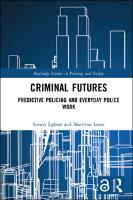Criminal Futures
Predictive Policing and Everyday Police Work
| dc.contributor.author | Egbert, Simon | |
| dc.contributor.author | Leese, Matthias | |
| dc.date.accessioned | 2020-11-12T10:04:04Z | |
| dc.date.available | 2020-11-12T10:04:04Z | |
| dc.date.issued | 2021 | |
| dc.identifier | ONIX_20201112_9781000281729_4 | |
| dc.identifier.uri | https://library.oapen.org/handle/20.500.12657/42895 | |
| dc.description.abstract | This book explores how predictive policing transforms police work. Police departments around the world have started to use data-driven applications to produce crime forecasts and intervene into the future through targeted prevention measures. Based on three years of field research in Germany and Switzerland, this book provides a theoretically sophisticated and empirically detailed account of how the police produce and act upon criminal futures as part of their everyday work practices. The authors argue that predictive policing must not be analyzed as an isolated technological artifact, but as part of a larger sociotechnical system that is embedded in organizational structures and occupational cultures. The book highlights how, for crime prediction software to come to matter and play a role in more efficient and targeted police work, several translation processes are needed to align human and nonhuman actors across different divisions of police work. Police work is a key function for the production and maintenance of public order, but it can also discriminate, exclude, and violate civil liberties and human rights. When criminal futures come into being in the form of algorithmically produced risk estimates, this can have wide-ranging consequences. Building on empirical findings, the book presents a number of practical recommendations for the prudent use of algorithmic analysis tools in police work that will speak to the protection of civil liberties and human rights as much as they will speak to the professional needs of police organizations. An accessible and compelling read, this book will appeal to students and scholars of criminology, sociology, and cultural studies as well as to police practitioners and civil liberties advocates, in addition to all those who are interested in how to implement reasonable forms of data-driven policing. | |
| dc.language | English | |
| dc.relation.ispartofseries | Routledge Studies in Policing and Society | |
| dc.subject.classification | thema EDItEUR::J Society and Social Sciences::JK Social services and welfare, criminology::JKS Social welfare and social services::JKSW Emergency services::JKSW1 Police and security services | en_US |
| dc.subject.classification | thema EDItEUR::J Society and Social Sciences::JK Social services and welfare, criminology::JKV Crime and criminology | en_US |
| dc.subject.other | Algorithmic Policing | |
| dc.subject.other | Critical Security Studies | |
| dc.subject.other | Organizational change | |
| dc.subject.other | Police Culture | |
| dc.subject.other | Police Organization | |
| dc.subject.other | Police Practice | |
| dc.subject.other | Policing and Security | |
| dc.subject.other | Predictive Policing | |
| dc.subject.other | Surveillance Studies | |
| dc.title | Criminal Futures | |
| dc.title.alternative | Predictive Policing and Everyday Police Work | |
| dc.type | book | |
| oapen.identifier.doi | 10.4324/9780429328732 | |
| oapen.relation.isPublishedBy | 7b3c7b10-5b1e-40b3-860e-c6dd5197f0bb | |
| oapen.imprint | Routledge | |
| oapen.pages | 242 | |
| peerreview.anonymity | Single-anonymised | |
| peerreview.id | bc80075c-96cc-4740-a9f3-a234bc2598f1 | |
| peerreview.open.review | No | |
| peerreview.publish.responsibility | Publisher | |
| peerreview.review.stage | Pre-publication | |
| peerreview.review.type | Proposal | |
| peerreview.reviewer.type | Internal editor | |
| peerreview.reviewer.type | External peer reviewer | |
| peerreview.title | Proposal review | |
| oapen.review.comments | Taylor & Francis open access titles are reviewed as a minimum at proposal stage by at least two external peer reviewers and an internal editor (additional reviews may be sought and additional content reviewed as required). |

